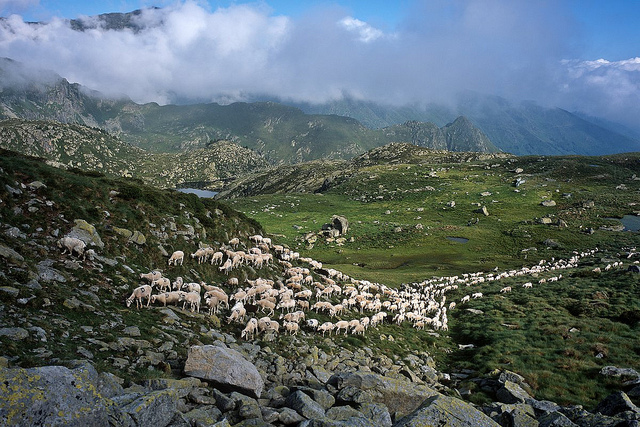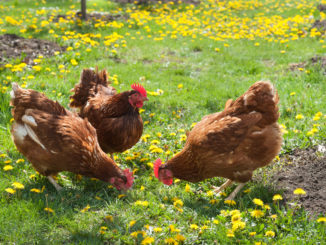
Oliver Moore in Ireland (updated 20.25 16/11/2018)
From a purely legal and technical standpoint, global trade (WTO) rules on competitiveness, as well as a sequence of EU treaties, mean that the Common Agricultural Policy (CAP) is supposed to be more environmentally sustainable now than it was. Indeed one of the reasons payments are still allowed under WTO rules is the 2003 CAP reform, which introduced compliance with environmental, phyto-sanitary, public and animal health laws and rules.
Despite this, in the European Parliament, there has been strong opposition by the agricultural committee to the environmental committee having any sort of a significant say in CAP. Things have changed somewhat in recent months, and there is now an opportunity for ENVI – the environment committee – to flex its muscles. But will it flex those pecs?
Business as usual reports have been issued
Draft reports from three Agriculture Committee MEPs – rapporteurs Esther Herranz García, Eric Andrieu and Ulrike Müller – amending the Commission’s CAP proposals (full text here: Commission’s CAP strategic plan) are available now in English. These refer to the Commission’s CAP strategic plan regulation (CSP, García), the common organisation of the markets in agricultural products (CMO Andrieu) and the financing, management and monitoring (FMM, so called horizontal regulation Müller) respectively.
These reports suggest changes, or amendments, to the articles in the Commission’s CAP proposal. The main one is probably that of Esther Herranz García. This was the subject of a twitter thread by Alan Matthews (15/11/2018) which he summarised as: “General impression of rapporteur’s amendments is that they protect area payments for income support, including to very large farms, and remove or weaken some of Commission’s attempts to raise environmental performance of CAP. Will ENVI Comm go along with this?”
While capping is an emotive, perhaps moral topic, in practice, imposing strict limits can be less impactful and difficult to implement (as Matthews himself has said). We also saw mixed opinions on capping in our short re:CAP series earlier this year, from a number of farmers and civil society organisations. Some find the idea of any offsetting of labour or social costs to be an anathema – it has never been done in any previous legalisation, and was not done last reform when degressivity or convergence of payments we also proposed.
Matthews finds that the report is quite a business-as-usual one, referencing considerations such as: basic income support maintained; a broad low ambition interpretation of the proposed eco-schemes; an effort to balance regions, member states and the single market; less-to-do in conditionality (formerly cross-compliance) and the removal of the weak-but-improvable ‘no backsliding‘ aspect of article 92, on climate and environmental measures.
His question on whether ENVI – full title “the Committee on the Environment, Public Health and Food Safety” – will go along with this is a valid one, and is more valid than it would have been in the past. This is because ENVI’s powers have been, to some extent unexpectedly, and in the face of strong opposition from the Agricultural Committee, increased some months back.
How much power has ENVI got?
With the stronger focus on climate and environment in the Commission’s CAP proposals, political group leaders in the Parliament agreed that ENVI should have more of a say in these areas – areas AGRI formerly had exclusivity on. Its now a shared, not an exclusive, competency, for ENVI.
Briefly: most relevant areas, from timetables to expertise, are now shared; in extreme cases, ENVI can force a vote at full parliament (i.e. plenary) level.
In more detail, what this means is rule 54 is in play. Rule 54 of the Rules of Procedure of the European Parliament is for when “the matter falls almost equally within the competence of two or more committees, or that different parts of the matter fall within the competence of two or more committees”
Rule 54 means committees working together, without one committee being dominant. So it means shared, agreed, timetables, more communication and cooperation, arbitration style procedures when there is disagreement (including bringing the group bosses – aka the Conference of Presidents – in the parliament in to settle a dispute).
Crucially, amendments can be taken to plenary – i.e. the main voting, decision-making process of the European Parliament. See direct quote from rule 54 below (emphasis added)
“if amendments on matters which fall within the shared competence of the committee responsible and an associated committee are not adopted by the committee responsible, the associated committee may table those amendments directly in plenary”.
Power in which areas?
Some of the specific areas Matthews’ cites are now shared between ENVI and AGRI – the eco-scheme proposal, conditionality, monitoring policy performance, files related specifically to the Paris (Climate Change) agreement air quality and so on.
Correspondences seen by ARC2020 name the following specific articles and recitals ENVI now has the above shared powers in:
|
– Article 4(1)(b)(iii), definitions – Article 5(1)(b), general CAP objectives – Article 6(1)(d) – (f), specific CAP objectives – Article 6(1)(h) – (i), specific CAP objectives – Article 11, conditionality principles & scope – Article 12, conditionality obligations – Article 28, “eco-schemes” (for climate and environment) – Article 42(c) and (h), objectives for fruit and veg coupled payments – Article 42(d) – (e), environmental objectives for fruit and veg coupled payments – Article 43, types of intervention fruit & veg coupled payments – Article 51, objectives for wine coupled payments – Article 54(4), environmental rules for wine coupled payments – Article 55(e) – (f), environmental objectives for hops coupled payments – Article 56(c) – (d), environmental objectives for olive coupled payments – Article 59(d) – (e), environmental objectives for miscellaneous coupled payments – Article 60, intervention types for miscellaneous coupled payments – Article 64, types of rural development interventions – Article 65, environment/climate payments in rural development pillar – Article 66, ANC (areas of natural constraints, formerly “less favoured areas”) – Article 67, payments for abiding by area based environmental requirements of birds and habitat directive areas (Natura 2000 zones) & water framework directive – Article 71(8), length of collective envi-climate actions – Article 86(2), environment/climate spending – Article 87, tracking climate spending – Article 92, – Article 97(2)(a) – (b), – Articles 123 – 124, performance bonus |
– Recital 1, imperative and aims – Recital 11, challenges, CAP objectives – Recital 15, risk management – Recital 16 – 17, ambition in environment and climate objectives, rural development , food security, other societal demands – Recitals 21 – 22, conditionality (formerly cross compliance/greening); Good farm practice (GAEC) – Recitals 23 – 24, conditionality (SMRs); FAS farm advisory service – Recital 31, “eco-schemes” – Recitals 37 – 39, rural development – Recital 45, co-operation , CLLD, EIP – Recital 50, no R support for practices harming the environment – Recital 52, Paris climate deal and Sustainable development goals, % for climate results – Recital 55, coherence between other polices, single plan per MS – Recital 59, SWOT needs assessment to feed into creating strategic plan – Recital 74, indicators to check results-based performance – Recital 76, under-performance and funding suspensions – Annex I, Indicators – Annex II, WTO support – Annex III, Conditionality – Annex XI EU legislation on climate and environmental, to which the MS strategic plans must contribute (art. 96, 97, 103) – Annex XII Core indicators used for reporting on art.128 |
So if you search for these articles in this document – the CAP strategic plan – you’ll see what ENVI now has this more significant say in.
This can be a very interesting experience. Indeed the very first one mentioned – article 4 (1) (b) (iii) refers to permanent grassland, and, specifically, a topic ARC and others have asked questions of regarding direct payments, peasant farming, agroforestry, biodiversity and transhumance.
It states: “‘permanent grassland and permanent pasture’ (together referred to as ‘permanent grassland’) shall be land not included in the crop rotation of the holding for five years or more, used to grow grasses or other herbaceous forage naturally (self-seeded) or through cultivation (sown). It may include other species such as shrubs and/or trees which can be grazed or produce animal feed;”
The Garcia amendment suggests adding the following:
“provided that the grasses and other herbaceous forage are predominant. It may also be land used for pasture that forms part of local established practices, under which grasses and other herbaceous forage have not traditionally predominated on pastureland, or else land used for pasture in which grasses and other herbaceous forage are not predominant, or are not present, on the pastureland. Where Member States so decide, land for pasture that has been rotated during the past five years or more shall be excluded from the definition.” (bold and italics in original)
and does so on the justification that:
“The Commission’s proposal represents a step backwards in relation to the agreement reached in relation to the negotiation of the ‘Omnibus’ Regulation, which took into account the special characteristics of Mediterranean pastures, and of meadows. It is necessary to maintain the essential elements of that definition in order to avoid discriminatory treatment.”
It’s worth mentioning in passing that, in this particular small but nonetheless significant case, the proposed amendment is worth supporting from an agroecological and peasant farming perspective.
Nevertheless, much further analysis of articles and recitals is needed.
So what’s next?
In theory, ENVI votes before AGRI, but in practice this may prove difficult. Minor short term amendments may not be as important to ENVI as longer term achievements, including at plenary. With the rapid pace of legislation underway, criticised by ENVI as “bulldozing” compared to other CAP reforms, ENVI may bide its time for now.
The Deadline for Amendments is 3rd December, with opinion-giving committees falling within a week before and a week after, with a vote in Comagri 18/19th February and vote in plenary March 2019.
More information is still needed with regard to the overall EU budget, and what proportion that leaves for CAP. It also remains to be seen if anything will come of the fact that the ECA – European Court of Auditors – were extremely disparaging of the Commission’s CAP proposals, including on areas such as climate change and environmental ambition.
What role citizen interests, and citizen pressure, will play too remains to be seen. Surveys of Europeans suggest a movement towards environmental issues. This includes this Eurobarometer one on CAP from December 2017) “At least half the respondents mention also protecting the environment and tackling climate change (50%). Compared to the last EB survey in 2015, there has been a six-point increase in the proportion of respondents that mention providing safe, healthy food of high quality as the main objective of EU agricultural and rural development policy, and a six-point increase in the proportion who mention protecting the environment and tackling climate change.”
How the environment committee uses its newly found powers will be fascinating as it unfolds.







2 Trackbacks / Pingbacks
Comments are closed.